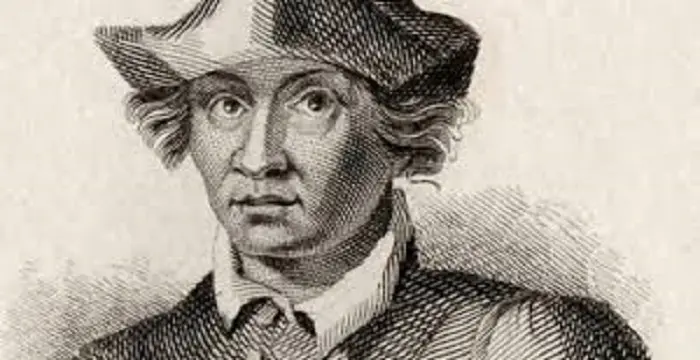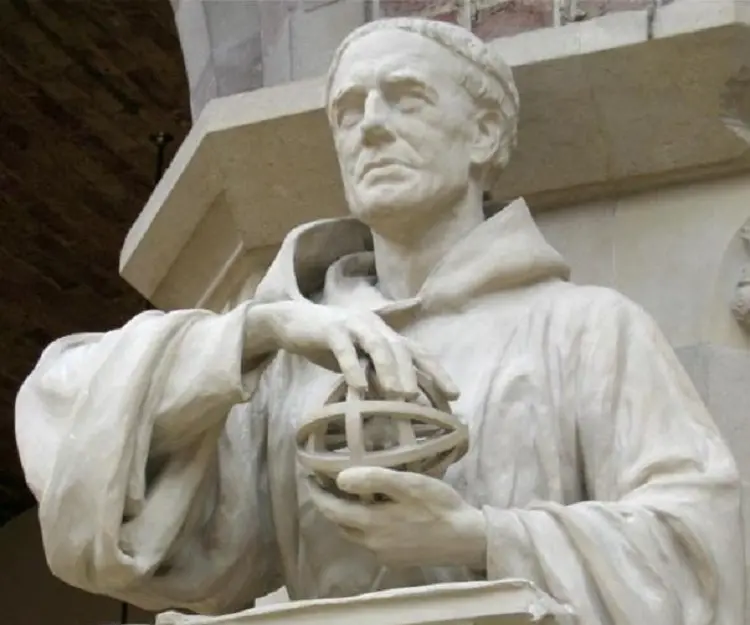
Roger Bacon - Intellectuals & Academics, Life Achievements and Childhood
Roger Bacon's Personal Details
Roger Bacon was a 13th century English philosopher
| Information | Detail |
|---|---|
| Birthday | 1214 |
| Died on | January 1, 1294 |
| Nationality | British |
| Famous | Intellectuals & Academics, Philosophers |
| Known as | Doctor Mirabilis |
| Universities |
|
| Discoveries / Inventions |
|
| Birth Place | Ilchester |
| Religion | Catholicism |
| Gender | Male |
| Born in | Ilchester |
| Famous as | Philosopher |
| Died at Age | 80 |
// Famous Philosophers
Martin Buber
One of the greatest philosophers to have ever walked on earth, Martin Buber contributions to philosophy is a long-standing one. Explore all about his profile, childhood, life and timeline here.
Lao Tzu (Laozi)
Lao Tzu was a legendary Chinese philosopher who wrote the important “Daodejing”. This biography profiles his childhood, life, career, achievements and timeline.
Alan Watts
Alan Watts was a famous British philosopher known for his Zen teachings and interpretations of Eastern philosophy. Read more about this great philosopher in the following article.
Roger Bacon's photo
Who is Roger Bacon?
Roger Bacon, OFM was a 13th century English philosopher and Franciscan Friar who was posthumously awarded the scholastic accolade “Doctor Mirabilis” meaning “Wonderful Teacher”. Not much is known about him or his family with certainty, but it is believed that they were wealthy and were exiled in the times of King Henry III of England. He received his education at Oxford and soon began teaching there. He was a disciple of the famous scholastic philosopher and theologian, Robert Grosseteste. At Oxford and at the University of Paris where he later taught, he talked about the importance of modern scientific methods introduced by Aristotle. Drawing inspiration from Aristotle and the Muslim scientist Alhazen he invested a lot of money in gathering secret books, conducting experiments and learning other languages. He became a Friar in the Franciscan Order, but his relationship with the other members was strained and his beliefs led to disagreements and finally imprisonment/house arrest. Contrary to the view that he was a modern thinker, scholars now think of him as a brilliant schoolman, who at the right time understood the advantages of the new learning and the importance of philosophy. He is also accredited for inventing gunpowder and reforming the calendar, while predicting submarines, automobiles and aircrafts.
// Famous Intellectuals & Academics
Bertil Gotthard Ohlin
Bertil Gotthard Ohlin was a famous Swedish economist. This biography profiles his childhood, family life & achievements.
Emily Greene Balch
Emily Greene Balch was an American economist, sociologist and pacifist who won the 1946 Nobel Peace Prize. This biography of Emily Greene Balch provides detailed information about her childhood, life, achievements, works & timeline.
Martin Buber
One of the greatest philosophers to have ever walked on earth, Martin Buber contributions to philosophy is a long-standing one. Explore all about his profile, childhood, life and timeline here.
Childhood & Early Life
Roger Bacon was born in Ilchester in Somerset. His exact year of birth has always been a topic for controversy and historians state it as 1213 or 1214, going by his statement in the book ‘Opus Tertium’, written in 1267.
The only information known about his family today is that they were considerably wealthy but during the reign of Henry III of England most of them were exiled and their property was annexed.
His earliest education was in geometry, arithmetic, music, astronomy and the classics. For further education he went to the Oxford University and developed an interest in natural philosophy and mathematics. It is believed that he did his M.A. either at Oxford or at Paris, in 1240.
Career
Roger Bacon became a master at Oxford. He gave lectures in the faculty of arts and they were mainly about Aristotelian and pseudo-Aristotelian treatises.
His next appointment was at the Paris University and he joined it somewhere between 1237 and 1245. Here he talked about Aristotelian Corpus (Compilation of Aristotle’s work) which included physics, meta-physics and the pseudo-Aristotelian De Vegetabilibus and the De Causis.
In 1247, he was inspired by the great scholar Robert Grosseteste and he began investing his time and money in acquiring secret books, training assistants, meeting savants and constructing instruments. He ardently researched optics, alchemy, astronomy and linguistics.
With some certainty it can be stated that he became a friar in the Franciscan Order in 1256 and in 1260, Master General Bonaventure issued a decree that prohibited friars from publishing books without the Order’s prior approval.
Bonaventure and Bacon remained much at odds due to their individual beliefs. Bonaventure believed that astrology was helpful in only predicting the things solely dependent on movement of heavenly bodies and that base metals couldn’t be converted into gold/silver; Bacon differed on both accounts.
In order to bypass the Order’s decree he contacted Cardinal Guy le Gros de Foulques, who became Pope Clement IV in 1265. The Pope issued a papal mandate asking Bacon for his philosophical writings and his view on the possibility of philosophy in theology.
In reply Roger Bacon sent his ‘Opus Majus’, ‘Opus Minus’ and ‘De Multiplicatione Specierum’. In his books he mentioned how science and Aristotle’s philosophy could be applied in establishing a new way of learning, which would also bring about the welfare of the Church.
His luck ran out when the Pope passed away in 1268 and left no official review or opinion on his works.
His next writings were ‘Communnia Naturalium’, ‘Communia Mathematica’ and ‘Compendium Studii Philosophie’. The Order put him under house arrest sometime between 1277 and 1279 on the accounts of his beliefs in alchemy and the general disregard for other innovators.
He believed that humans were incapable of educational reform until they got rid of frail and unsuitable authority, eradicated long customs, stopped supporting uninstructed popular opinions and concealed their ignorance by displaying apparent wisdom.
His book ‘Epistola de Secretis Operibus Artis et Naturae, et de Nullitate Magiae’ (Letter on the Secret Working of Art and Nature, and on the Vanity of Magic) disregarded magical practices and had the formula for the philosopher’s stone and possibly gunpowder.
He was a detractor of the Julian calendar and proposed that one day should be dropped every 125 years to make up for the error. He believed that due to the errors in the present calendar Christians were celebrating Easter on the wrong day.
Major Works
Roger Bacon is accepted as one of the earliest European advocates of the modern scientific methods in which results are cited only after experimentation and not solely on the basis of the findings of predecessors. He used parts of glass spheres as magnifying glasses to demonstrate that light reflects from objects rather than being released from them and for the first time introduced a mixture which could be used in making gunpowder.
Personal Life & Legacy
Roger Bacon passed away in 1292.
Many books have been written about him including ‘Doctor Mirabilis’, ‘The Face in the Frost’, ‘Fifth Business’ and ‘The Black Rose’.
// Famous British peoples
Wentworth Miller
Wentworth Miller is an American actor and screenwriter who achieved recognition for his role in the TV series ‘Prison Break’.
Sophie Reade
Sophie Victoria Reade is a British model and reality show star. Let’s take a look at her family and personal life, including her age, birthday, boyfriends, and some interesting facts.
Josh Temple
Check out all that you wanted to know about Josh Temple (Slogoman), the famous British YouTube Personality; his birthday, his family and personal life, his girlfriends, fun trivia facts and more.
Roger Bacon biography timelines
- // 1214Roger Bacon was born in Ilchester in Somerset. His exact year of birth has always been a topic for controversy and historians state it as 1213 or 1214, going by his statement in the book ‘Opus Tertium’, written in 1267.
- // 1237 To 1245His next appointment was at the Paris University and he joined it somewhere between 1237 and 1245. Here he talked about Aristotelian Corpus (Compilation of Aristotle’s work) which included physics, meta-physics and the pseudo-Aristotelian De Vegetabilibus and the De Causis.
- // 1240His earliest education was in geometry, arithmetic, music, astronomy and the classics. For further education he went to the Oxford University and developed an interest in natural philosophy and mathematics. It is believed that he did his M.A. either at Oxford or at Paris, in 1240.
- // 1247In 1247, he was inspired by the great scholar Robert Grosseteste and he began investing his time and money in acquiring secret books, training assistants, meeting savants and constructing instruments. He ardently researched optics, alchemy, astronomy and linguistics.
- // 1256 To 1260With some certainty it can be stated that he became a friar in the Franciscan Order in 1256 and in 1260, Master General Bonaventure issued a decree that prohibited friars from publishing books without the Order’s prior approval.
- // 1265In order to bypass the Order’s decree he contacted Cardinal Guy le Gros de Foulques, who became Pope Clement IV in 1265. The Pope issued a papal mandate asking Bacon for his philosophical writings and his view on the possibility of philosophy in theology.
- // 1268His luck ran out when the Pope passed away in 1268 and left no official review or opinion on his works.
- // 1277 To 1279His next writings were ‘Communnia Naturalium’, ‘Communia Mathematica’ and ‘Compendium Studii Philosophie’. The Order put him under house arrest sometime between 1277 and 1279 on the accounts of his beliefs in alchemy and the general disregard for other innovators.
- // 1292Roger Bacon passed away in 1292.
Roger Bacon's FAQ
When was Roger Bacon died?
Roger Bacon was died at 1294-01-01
Where was Roger Bacon died?
Roger Bacon was died in Oxford
Which age was Roger Bacon died?
Roger Bacon was died at age 80
Where is Roger Bacon's birth place?
Roger Bacon was born in Ilchester
What is Roger Bacon nationalities?
Roger Bacon's nationalities is British
What was Roger Bacon universities?
Roger Bacon studied at University of Oxford
What is Roger Bacon's inventions/discoveries?
Magnifying Glass was invented (or discovered) by Roger Bacon
What is Roger Bacon's religion?
Roger Bacon's religion is Catholicism
How famous is Roger Bacon?
Roger Bacon is famouse as Philosopher








